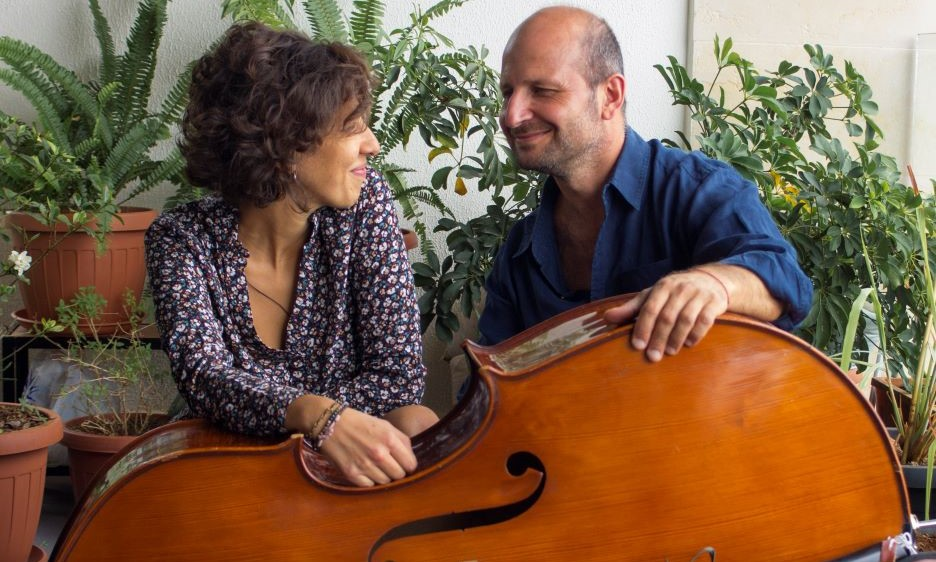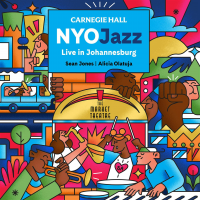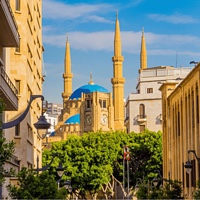Home » Jazz Articles » Interview » Hayeli: Mirrors Unto The Improvising Soul
Hayeli: Mirrors Unto The Improvising Soul

I think free improvisation is the ultimate form of music making because it requires everything; you have to be really open minded, open hearted... and humble.
—Khachatur Savzyan & Donna Khalifé
Their debut album, Home (Self Produced, 2025), is a visceral, haunting and ultimately uplifting affair. In essence, home means belonging—an attachment to place and to people, for sure, to landscape and to soundscape as well.
But for Khalifé and Savzyan home is also a way of being. It is bound up with the idea of freedom. In musical terms, improvisation is perhaps the greatest expression of freedom.
"I think improvisation is the ultimate form of music making because it requires everything," Khalifé explains. "You have to master your instruments. And the more you master your instrument, the more you can do. You have to be really open minded, open hearted and humble, and not be afraid of being vulnerable because it's the most vulnerable place to be. You are naked—you are really naked."
Both Khalifé and Savzyan studied classical music and jazz at conservatoire level. These influences, more than others, are manifest on Home. But for these two musicians, an openness to all music is their passport to musical freedom. Musically, they are truly at home when free of stylistic constraints.
In improvised music, unlike pop and jazz, Savzyan reasons, musicians are largely free from the shackles of comparison. "You don't have all these dynasties behind your back..."
Two Bass Hit
Hayeli came into being in 2020, when Khalifé and Savzyan returned to Beirut after a year living in Yerevan, Armenia. The idea for a duo was driven by the logic of economics—two incomes coming into the same household.The duo's first steps Khalifé singing and Savzyan playing double bass. Little by little Khalifé incorporated her bass playing into the mix. Part of the reasoning behind this move was the rather unique selling point of a two-bass improvising unit. However, the musical challenge was also an allure. They were aware that for many people free improvisation equates with experimental music—often far removed from melody, harmony and rhythm. In other words, noise.
"We wanted to do free improvised music, but as if it was written," Khalifé explains. "If somebody listened to it they would think that it's written music. That was our aim and it's not an easy task because it requires a high level of instrument technique and musicianship."
As Home handsomely illustrates, free improvisation does not have to mean wild and untethered. In fact, on first listening, the music sounds structured and through-composed to a large degree. Outstanding musicians both, they make it seem like second nature, but as Savzyan explains, this is not necessarily the case.
"It's a really very difficult and challenging project. I mean, double bass itself as an instrument...it's not easy to express yourself. Technically, it's very challenging to play virtuoso things on the bass. Any kid, seven years old, eight years old, on clarinet or on flute can play very easily a nice melody, which to play on double bass you need to practice I don't know how many years. So to make this project interesting is really challenging."
Challenging it may be, but their commitment is unwavering. "We have to say that this project is a lifetime project, and we are definitely growing together," Savzyan emphasizes.
The Armenian bassist came to Lebanon in 2007 when he was offered a one-year renewable contract with the Lebanese Philharmonic Orchestra. "They invited me to play in the orchestra, and I was thinking I would come for one year, but each year I was saying, 'OK, this is the last year here.' And then things changed, you know, the crisis, economic crisis, devaluation of the money. My family life changed, I divorced, and then we found each other, and now I'm here with Donna."
The French Connection
Hayeli's stomping ground is Beirut, though they will play anywhere in the country where they can. Khalifé explains their modus operandum: "The concerts that we do in Hayeli are mostly free improvised sets. Sometimes we do invite people, but we really don't meet before. We just know what their world is, and we know that they can improvise—people who are willing to take that risk. And like it's not like we are two bases accompanying them, whether they are soloists or not—we're really improvising together, building something together, searching together, finding, or not finding."Reflecting some of Hayeli's live performances, the duo invited two musicians to guest on Home—violist Guillaume Roy and cellist Sary Khalifé (no relation).
It was during her studies in conducting and orchestration at the conservatoire in Paris that Khalifé encountered Roy. "Guillaume was my teacher. He introduced me to the free improvised world, where I really found myself. He had a very high standard. But at the same time, he was very cool. I liked him very much and he became kind of, you know, a big brother to me, even when I was in France."
It was always Khalifé's intention to invite Roy to play in Lebanon. Hayeli's debut album provided the impetus. "I thought that would be an amazing opportunity to bring him in. I completely trust him, and I know what will come out. I knew that in a format like this, it will work—it always works, because he's somebody who makes music work. I love playing with him and I was sure that Khachatur was going to love him and enjoy playing with him. It's always learning from Roy."
Savzyan concurs; "There's a lot to learn from him. He's kind of an inspiration and a really very serious professional, so it was really a pleasure working with him."
Likewise, the bassists are fulsome in their praise of France-based Sary Khalifé "Sary is a relatively young musician, but he's very talented in improvising," says Savzyan. "He comes from a big family of musicians."
Music is in the blood of Sary Khalifé, nephew to the great Lebanese oud player and singer-songwriter, Marcel Khalifé. Little wonder then that Sary Khalifé has such a broad musical vocabulary. "He also has a classical background and an oriental background," Savzyan adds.
"He's a complete virtuoso of his instrument," agrees Donna, "and he has an amazing sound. It's very easy to play with him—without any display of ego display in improvising, which is essential."
Home is bookended by the title track and "Wholeness"—duo performances by the bassists. The cellist and violist feature on nine of the album's dozen tracks, either in trio or quartet formation. Two pieces, "Saffara" and "Current Situation" are through composed, but the remainder of the tracks are improvised dialogues.
The interaction between the musicians is so cohesive, and their interweaving lines so harmonious, that the casual listener might assume that they are following clear and precise instruction. The reality, as Khalifé explains, was quite different. "There were no real guidelines," she clarifies.
Even the text that Khalifé recites on "Why Do We Persist" was a spontaneous decision, while the pieces were named after the music was created.
The duo's approach is one of risk and reward. "What is amazing in improvisation is that you have to keep your ears open all the time," says Khalifé. "You know, we are all serving a higher purpose. The philosophy is really to go towards the other and to make the other sound amazing. When you have just this in your head, there's no way that it will not be good... Of course, I'm not going to say that everything we recorded is nice. There is maybe some stuff where you feel that we are searching and not finding... "
Do you have reason? Why Then Do You Not Use It?
Philosophy of a more formal kind drives "Marcus Aurelius," where Savzyan's pulsing double bass and Roy's sawing viola accompany Khalifé's recital of a Stoic meditation by Roman emperor Aurelius."When we had the music I really liked it, but I felt something was missing. I was hearing a spoken voice. I was not sure if I have to speak or somebody else, but for sure it had to be a spoken voice; but what can be said? And then right away, you know, meditations came to me."
Savzyan had introduced Aurelius' meditations to Khalifé some years earlier. Their impact, as Khalifé explains, has been enduring. "You can read the meditations every year and you will have a different perspective and different thoughts. It will resonate differently. I just went with the things that I felt were resonating very much with me now."
Written nearly two thousand years ago, Aurelius' meditation teaches reason, being in the moment, focusing on the task in hand and spurning distractions. The act of doing something in the here and now —without expectation and without fear—is at the heart of his Stoic philosophy.
For Savzyan, such wisdom is a blueprint for life, and by extension, Hayeli's approach to making improvised music.
"Of course, we are playing our inner world, how we see the world, how we see life. This is what comes out when we make music, especially when we are improvising free. I believe this is what comes out in the end, and this is the most important thing for me in music. It always starts from inside—you have to have things to say and then find ways to say it."
Whistle Blowing
Life in Lebanon is rarely straightforward. The last time All About Jazz spoke with Khalifé —to talk about her album Hope is the Thing with Feathers—Beirut was convulsed by the anti-government October Revolution that brought the masses onto the streets, day after day. That was in 2019. Since then, the country has gone through COVID, the massive explosion in Beirut's port, and yet another debilitating conflict between Hezbollah and Israel.All this turmoil, naturally, has massive socio-economic repercussions. Several tracks from Home offer responses to the chaos. "Saffara"—one of two composed tunes on the album—sees Khalifé turn to the words of Lebanese poet Mohammad Al Abdallah.
There is an urgency to the quartet's exchanges, an emotive release, as Khalifé, singing Al Abdallah's poetry in Arabic, calls on people to bear witness to wrongdoing—to blow a whistle like a policeman calling out transgressions, to carry a notebook and make a record when confronted by violations.
"I really like this poem," says Khalifé. "He has a lot of poems like that—there is something very true, but with a little bit of humor. This poem resonated particularly with me because it was talking about this decadent world we are living in, you know. He depicts a little bit this helplessness we live in where we feel we cannot do anything. It was exactly the emotions I felt.
"Okay, so I'm not able to do anything, but at least I can have a whistle, and I can blow it, which I feel that sometimes I'm doing. I'm always rebelling and saying, no, this cannot be! But of course, I know in vain, but just to bear witness. It did me good when I read this, you know, I felt like I'm not alone—that we are not alone."
That there is always something for the Lebanese people to keep on bearing witness to is reflected in the title of "The Day After." Khalifé's improvised vocals soar over bass pulse, biting arco rhythms and edgy trilling on one of the album's most dramatic tracks.
"It's a phrase that we heard a lot last year—the day after, the day after. It's been five years we are hearing it—the day after the explosion... what is the day after? Other than our traumas, other than an apocalyptic situation that we don't even know how deep we can go. There was no intent in doing a track like that," Khalifé acknowledges, "but when we heard what was recorded, we felt that it was just that."
The improvisation—and the title that shapes the narrative around it—can be interpreted in more than one way, as Khalifé sees it. "In the second part of the track there is a little bit of love in it and a bit of hope. It's like we are trying to build up, we are trying to grow, despite all the tension, despite all the destruction, despite whatever trauma there was at that time."
Carpe Diem
"Current Situation," the only other through composed track on the album, is also charged with heightened emotion and intense playing from all four musicians."When I wrote this song, it was when Gaza started," Khalifé relates. "We were feeling the same helplessness. We are watching a live genocide, and we cannot do anything. We are watching people lying arrogantly in front of us and we were very, very frustrated. And plus we were waiting for it to happen here because they were threatening Lebanon all the time. Everything was continuing normally but we knew that at any moment it could explode."
Things exploded in September with the start of an intense Israeli bombing campaign that killed hundreds of people across Lebanon. "Of course, for three months we didn't do anything—everything was stopped," says Khalifé.
"Eventually people decided that, okay, we have to move on. We have to continue. So, life returned a little bit, but it's still going on in the south. It's not safe in the south and we don't know what is going to happen, if they're going to take our land. We have no idea."
After so long living under heightened stress and in a high state of uncertainty there has been an energized return to live music, to the arts in general.
"As for the Beirut life and our life, the artistic life, it's kind of booming now, because I think people are thirsty," Khalifé reasons. "Maybe it's a PTSD reaction, but I know that in January there's a shift that happened in my head and I'm overworking and over being, trying to be overactive, you know? Because we never know when we're going to stop," says Khalifé, barely pausing to draw breath.
"Between one problem and another problem in Lebanon you have to live your maximum life. We cannot have time now for procrastination. So we are doing our maximum; One, is to be active. And the second thing is to have a little bit of money aside so not to have financial difficulties every time there is a war."
Our Home Too
It is easy to forget how beautiful Lebanon is, with its long Mediterranean coastline and its cedar-coated, snow-capped mountain range from which most of the country's sixteen rivers flow.The fertile soils of the Beqaa valley are dotted with vineyards and citrus orchards, food staples and cotton crops, as well as cannabis—legal for medicinal purposes—and opium. Then there are Byblos and Baalbek, two of the most impressive Roman sites in the region.
The landscape is not without its problems. Deforestation and wildfires pose serious concerns. Waste dumping is a blight.
Yet in spite of wars and natural exploitation, Lebanon is still home to wolves, hyenas, boars, wildcats and red foxes, fish and reptiles. The freshwater wetlands in the Beqaa Valley are a magnet for numerous types of migratory bird.
In many ways it is fitting that the first notes on Home are struck up not by brooding bass lines or urgent strings, but by singing birds. Birdsong as intro or outro colors several tracks—markers too, of home.
More striking—and a little unnerving—is the seventy-second chorus of howling that is "Chacal." Jackals, it seems, are common in Lebanon, especially around towns in the foothills, such as that where Khalifé and Savzyan live.
"They are everywhere," Savzyan simplifies. "They are around our house," adds Khalifé. The couple talk about the jackals in tones of both awe and affection.
I find them really fascinating," says Khalifé. "Sometimes we hear them outside, so we jump to the window or on the balcony just to see. We always wonder okay, he's calling for what, this first one? And why do they do they howl after him, you know? I imitate them all the time. And sometimes when they are howling, I start doing it with them—to see if they're going to understand."
"Very often when they are coming at night, especially when it gets dark, they go out all around our building," continues Savzyan. "A few days ago at four o'clock it was light—very far from being dark—and one was crossing the road very easily in front of my car. He went behind the tree and started waiting. I stopped the car, I went back, opened the window and looked at him. We looked at each other a little bit and then he turned and left."
Determined that the jackals should be heard on Home, Khalifé borrowed recording equipment from a friend and waited her opportunity. Night after night the jackals came, but their presence was a silent one. Then one morning around 4am Khalifé was woken by a sound under their window.
"Without thinking I turned off the fridge, I went back to the mic, I pressed record and the first one started, because there's always one, I don't know, maybe the leader starts (Khalifé imitates the jackal's howl). And then the rest started. They were just under our window."
Almost as if the jackals were marking territory... or serenading. "It was a gift," Khalifé beams. "The best gift ever."
The Best Feeling
When asked what ideas they associate with home, besides the songs of neighborly birds and jackals, Khalifé and Savzyan speak of comfort, love, ancestral roots and spiritual growth, a sense of belonging. One wonders whether the greatest sense of home is felt when they are making music."Definitely" replies Khalifé. "Since a very long time I always thought that whatever I do, whatever happens to me, at least I have music. I think that I cannot live without it. It's the place where I feel the best. Of course, I'm not always feeling very comfortable in all circumstances, but in the end, this is where I want to be. I consider myself all the time very lucky to be doing what I'm doing, to be in a creative field where I have a little bit of control over how my life somehow would go."
Savzyan is quick to agree. "Of course, music is the place where I also want to be all the time. I'm always enjoy making music and I feel very good about it. But maybe I would add that in the end even music for me is ultimately a tool or a channel, if you want, to try to express yourself and at the same time find out what is home for you."
Still, the couple feels that is something more to add. "I would say maybe home for us also is to be together. Maybe it was very obvious, but for me to have found Khachatur after many years... I now really feel like I'm home. I do feel safe, I do feel comfortable, I do feel at ease, I do feel peaceful, I do feel love, I do feel creative, and I feel that now, from now on I can start to grow. I mean, I'm trying, but at least now I have the potential to do that."
"Yeah. I can say the same, of course," answers Savzyan. "The feeling of growing nicely together is the best feeling."
How appropriate that the sentiments expressed in their words, as in their music, should mirror each other's.
Tags
Interview
Donna Khalife
Ian Patterson
Khachatur Savzyan
Home
Guillaume Roy
spoke with Khalifé
Hope is the Thing with Feathers
Beirut
Lebanon
A Brief Guide To Lebanese Jazz
PREVIOUS / NEXT
Support All About Jazz
 All About Jazz has been a pillar of jazz since 1995, championing it as an art form and, more importantly, supporting the musicians who make it. Our enduring commitment has made "AAJ" one of the most culturally important websites of its kind, read by hundreds of thousands of fans, musicians and industry figures every month.
All About Jazz has been a pillar of jazz since 1995, championing it as an art form and, more importantly, supporting the musicians who make it. Our enduring commitment has made "AAJ" one of the most culturally important websites of its kind, read by hundreds of thousands of fans, musicians and industry figures every month.






















